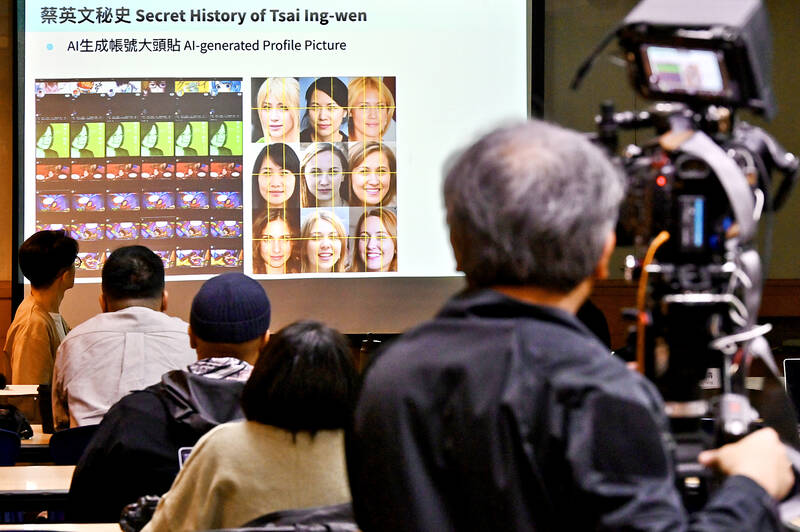China will continue to play up conflicts in Taiwan with more diverse tactics of information manipulation, Taipei-based think tank Doublethink Lab said in a report published yesterday.
The think tank analyzed the strategies and impact of the Chinese disinformation campaign on Taiwan’s presidential and legislative elections on Saturday last week and pointed out possible manipulation methods in the future.
Before last month, news outlets and social media accounts controlled by or affiliated with Chinese authorities focused on amplifying controversial issues in Taiwan to intensify social conflicts, a strategy they have adopted since 2022, the report said.

Photo: George Tsorng, Taipei Times
These foreign actors select certain narratives by Taiwanese politicians or pundits to spread US skepticism and defamatory information about the ruling party or its leaders, it said.
Leading up to the elections, Chinese actors began to create fake news, such as accusing the Democratic Progressive Party (DPP) of starting rumors about China pressurizing Taiwanese rock band Mayday to make pro-China comments, it said.
Beijing actively fueled rumors that Lai had illegitimate children and spread the content of a book titled “[President] Tsai Ing-wen’s (蔡英文) secret history,” which is filled with false statements about Tsai, it said.
Compared with the local elections in 2022, China used a large number of false accounts and generative artificial intelligence (AI) rather than its state media to disseminate disinformation, it said.
Doing so gave China more opportunities to spread slander and outrageous information, it said, adding that it also made the sources of disinformation more difficult to trace.
After the elections, Beijing is likely to continue playing up domestic conflicts in Taiwan rather than drawing Taiwanese attention to foreign actors, it said.
It might also focus on local issues to “better integrate into discussions in Taiwanese society,” and make it difficult for Taiwanese authorities and researchers to identify the source of information, it said.
Generative AI technology has significantly reduced the time and labor costs of content production, making it difficult to separate fake accounts from real users, and to detect fake accounts that originate from the same source, it said.
A survey conducted by the think tank before the elections showed that 37.6 percent of Taiwanese have never looked up or confirmed information they received online, despite a growing proportion of people receiving political information from online video creators and key opinion leaders, it said.
“Information manipulation in Taiwan has shifted toward conspiracy types of narrative,” which is more challenging to debunk, it said.
About half of the respondents agreed with US-skepticism narratives, such as “the US only wants to exploit Taiwan” and “the US uses Taiwan to provoke China,” it said.
While 40.4 percent of respondents declined to answer their perceived source of false information related to the elections, 26.6 percent of respondents attributed it to the DPP, followed by 15.2 percent who believed it originated from China, it said.
The survey was conducted via landlines and mobile phones from Jan. 1 to Wednesday last week.
It collected 1,504 valid samples and had a confidence level of 95 percent and a margin of error of 2.53 percent.

A car bomb killed a senior Russian general in southern Moscow yesterday morning, the latest high-profile army figure to be blown up in a blast that came just hours after Russian and Ukrainian delegates held separate talks in Miami on a plan to end the war. Kyiv has not commented on the incident, but Russian investigators said they were probing whether the blast was “linked” to “Ukrainian special forces.” The attack was similar to other assassinations of generals and pro-war figures that have either been claimed, or are widely believed to have been orchestrated, by Ukraine. Russian Lieutenant General Fanil Sarvarov, 56, head

SAFETY FIRST: Double the number of police were deployed at the Taipei Marathon, while other cities released plans to bolster public event safety Authorities across Taiwan have stepped up security measures ahead of Christmas and New Year events, following a knife and smoke bomb attack in Taipei on Friday that left four people dead and 11 injured. In a bid to prevent potential copycat incidents, police deployments have been expanded for large gatherings, transport hubs, and other crowded public spaces, according to official statements from police and city authorities. Taipei Mayor Chiang Wan-an (蔣萬安) said the city has “comprehensively raised security readiness” in crowded areas, increased police deployments with armed officers, and intensified patrols during weekends and nighttime hours. For large-scale events, security checkpoints and explosives

A magnitude 7.0 earthquake struck off Yilan at 11:05pm yesterday, the Central Weather Administration (CWA) said. The epicenter was located at sea, about 32.3km east of Yilan County Hall, at a depth of 72.8km, CWA data showed There were no immediate reports of damage. The intensity of the quake, which gauges the actual effect of a seismic event, measured 4 in Yilan County area on Taiwan’s seven-tier intensity scale, the data showed. It measured 4 in other parts of eastern, northern and central Taiwan as well as Tainan, and 3 in Kaohsiung and Pingtung County, and 2 in Lienchiang and Penghu counties and 1

‘POLITICAL GAME’: DPP lawmakers said the motion would not meet the legislative threshold needed, and accused the KMT and the TPP of trivializing the Constitution The Legislative Yuan yesterday approved a motion to initiate impeachment proceedings against President William Lai (賴清德), saying he had undermined Taiwan’s constitutional order and democracy. The motion was approved 61-50 by lawmakers from the main opposition Chinese Nationalist Party (KMT) and the smaller Taiwan People’s Party (TPP), who together hold a legislative majority. Under the motion, a roll call vote for impeachment would be held on May 19 next year, after various hearings are held and Lai is given the chance to defend himself. The move came after Lai on Monday last week did not promulgate an amendment passed by the legislature that